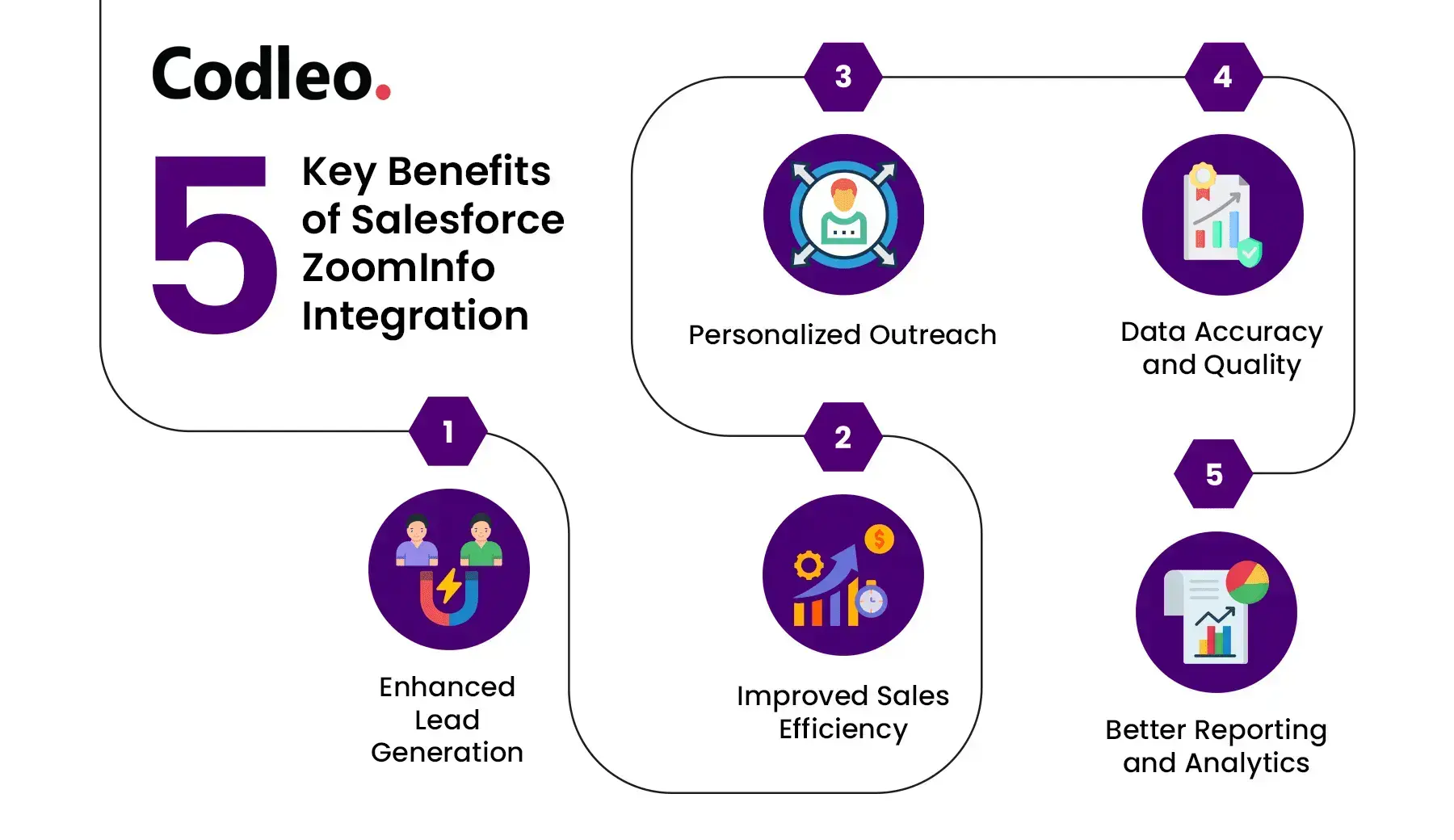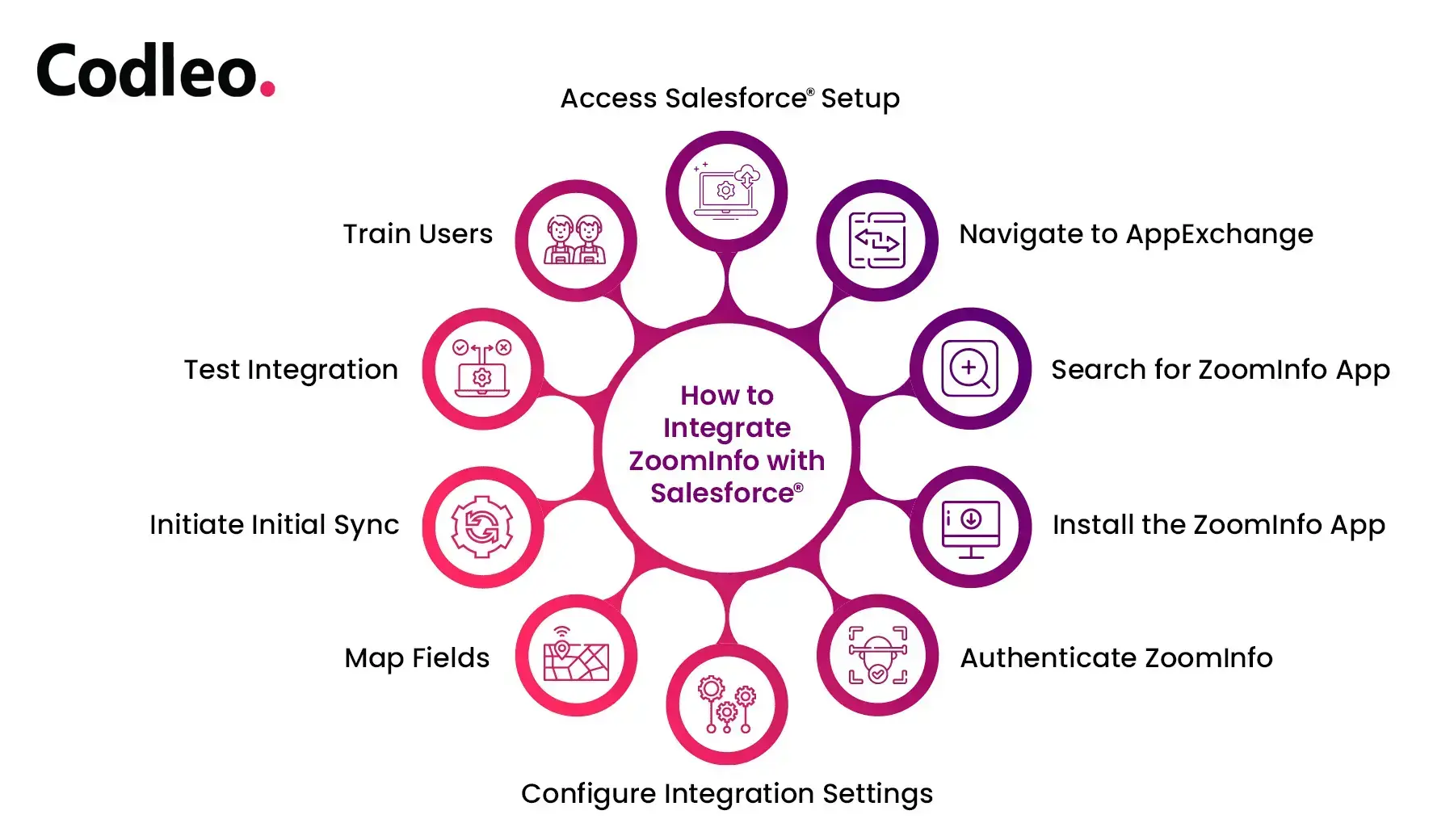Publish date:
ZoomInfo powers market strategies for over 35,000 companies, helping them connect with top prospects, prioritize leads, and achieve more. On the other hand, Salesforce serves as the central hub for customer interactions for more than 150,000 enterprises worldwide.
Now, imagine the potential results when you integrate ZoomInfo with Salesforce. By combining these powerful platforms, you can enhance data accuracy, simplify lead management, and boost your sales and marketing performance. This guide will walk you through the process of integrating ZoomInfo with Salesforce, outlining the requirements and steps involved.
Requirements for ZoomInfo-Salesforce Integration
Before integrating ZoomInfo with Salesforce, consider these essential requirements:
-
Supported Salesforce Editions: The integration works with most Salesforce editions, including Professional, Enterprise, Unlimited, and Performance. Some features may vary depending on your edition.
-
ZoomInfo Account: A ZoomInfo account with the necessary permissions is required to access and integrate data with Salesforce.
-
API Access: Both Salesforce and ZoomInfo require API access for the integration. You’ll need to generate API credentials for both platforms.
-
Data Mapping: Properly align data fields in Salesforce and ZoomInfo to ensure accurate and consistent data transfer.
-
User Permissions: Determine which users in your organization need access to the integrated data and configure permissions accordingly.
-
Data Governance: Implement data quality policies and procedures to ensure compliance within the integrated system.
How to Integrate ZoomInfo With Salesforce?
Integrating ZoomInfo with Salesforce helps keep your Salesforce records updated with the latest data from ZoomInfo, ensuring your CRM data is accurate and complete. Follow these steps to integrate ZoomInfo with Salesforce:
1. Access Salesforce Setup
Log in to your Salesforce account and click your profile icon in the top-right corner. From the dropdown menu, select “Setup” to open the Salesforce Setup page, where you’ll find various administrative tools and settings.
2. Go to AppExchange
In the Salesforce Setup menu, scroll down or use the search bar to find “AppExchange.” Click on it to enter the marketplace for Salesforce-compatible apps and integrations.
3. Search for the ZoomInfo App
In the AppExchange, use the search bar at the top to type “ZoomInfo” and press Enter to start your search.
4. Install the ZoomInfo App
Look through the search results to find the ZoomInfo app. Click on the listing to see more details about the app, including its features and user reviews. Click “Get It Now” to begin the installation process and follow the on-screen instructions to complete it.
5. Authenticate ZoomInfo
Once the app is installed, return to the Salesforce Setup menu. Go to the “Installed Packages” section, find the ZoomInfo package, and click on it. Follow the provided instructions to authenticate ZoomInfo in Salesforce, which usually involves entering API keys or credentials from ZoomInfo.
6. Configure Integration Settings
In the ZoomInfo integration settings, you can adjust various options to fit your needs. This might include setting up how often data syncs, choosing which data to sync, and configuring field mappings.
7. Map Fields
Go to the field mapping section in the integration settings. Here, align ZoomInfo data fields (like contact details and firmographics) with the corresponding Salesforce fields (such as contact and account details) to ensure smooth data transfer.
8. Start the Initial Sync
After setting up the integration and mapping fields, start the initial sync between ZoomInfo and Salesforce. This process will transfer existing data from ZoomInfo into Salesforce and establish the connection.
9. Test the Integration
Create test records in ZoomInfo, such as contacts or accounts, and check if they appear correctly in Salesforce. Run various tests to ensure that data syncs properly and consistently between ZoomInfo and Salesforce.
10. Train Your Users
Provide training for Salesforce users on how to access and use ZoomInfo data within Salesforce. Make sure they understand how to use the integrated data effectively to support their sales and marketing efforts.
Integrating ZoomInfo with Salesforce enhances your CRM’s data accuracy and supports your sales and marketing strategies by providing up-to-date information and streamlined processes.
5 Key Benefits of ZoomInfo-Salesforce Integration

Integrating ZoomInfo with Salesforce offers significant benefits for businesses looking to enhance their sales and marketing efforts. Here are five key advantages:
-
Boosted Lead Generation Access ZoomInfo’s vast database directly within Salesforce. This integration allows your sales and marketing teams to quickly identify and qualify top leads, making your lead generation more effective.
-
Increased Sales Efficiency Streamline your sales process with automated lead enrichment and CRM updates. Keeping prospect data current allows your sales reps to spend more time engaging with leads and closing deals, resulting in higher productivity and efficiency.
-
Tailored Outreach With detailed prospect information, your sales teams can create personalized outreach and messaging. This targeted approach leads to more meaningful interactions, higher conversion rates, and stronger customer relationships.
-
Accurate and Reliable Data Maintain data integrity with the ZoomInfo-Salesforce integration. The integration continuously updates your CRM with the latest information, reducing errors and improving decision-making with accurate and reliable data.
-
Enhanced Reporting and Insights Take advantage of powerful reporting and analytics features provided by the integration. Gain valuable insights into key metrics, track campaign performance, and optimize your sales and marketing strategies with actionable data.
Conclusion
Discover how Codleo Consulting can enhance your Salesforce experience with seamless ZoomInfo integration. Whether you're seeking to optimize lead generation, personalize outreach, or boost your marketing performance, our expertise as a Salesforce partner and Salesforce consulting firm can help you achieve your goals. Contact Codleo Consulting today to unlock your CRM’s full potential and drive success.
To maximize the benefits, encourage collaboration within your team. By working together and finding innovative ways to leverage this integrated data, you’ll experience significant improvements in customer engagement and revenue growth. If you’re looking for expert guidance on this integration, partnering with a specialized Salesforce integration partner can make the process seamless and effective.

















